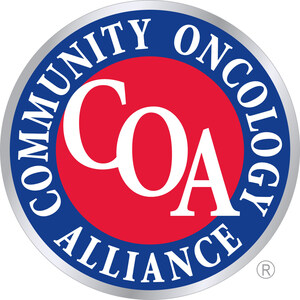Study Reveals Shift To 340B Hospitals Increases Costs Of Cancer Treatment For Seniors And Medicare
New Research Finds Patient Shift from Physicians' Community Cancer Clinics to Hospitals Increases Cost of Cancer Care
WASHINGTON, June 10, 2014 /PRNewswire/ -- The Berkeley Research Group (BRG) released a new study sponsored by the Community Oncology Alliance (COA) on the cost of cancer treatment. The study found that two independent trends, acting in combination, are currently resulting in increased Medicare fee-for-service (FFS) chemotherapy payments. These results reinforce similar findings in previous studies by Avalere Health, Milliman and The Moran Company.
The first trend is a shift in the site of care for cancer patients from physician-owned community cancer clinics to hospital outpatient departments. The second trend is the expansion of the delivery of oncology services by 340B hospitals in recent years through the acquisition of community cancer practices (typically comprising multiple treatment clinic sites). This expansion has led to higher costs to the Medicare program because of differences in payment for services provided in community cancer clinics as compared to hospital outpatient departments. The 340B drug pricing program enables health care organizations that care for underserved people to purchase outpatient drugs at discounted prices.
Key BRG study conclusions are:
- Between 2008 and 2012, chemotherapy claims for services performed in hospital outpatient departments increased from 1.20 million to 1.94 million, while claims for services performed at community cancer clinics decreased from 5.66 million to 4.72 million. During this same period, total chemotherapy claims have remained relatively constant at approximately 6.7 million per year.
- There is a clear shift in the site of care from physician-owned community cancer clinics to hospital outpatient departments.
- Of several factors contributing to this shift, acquired community cancer practices are a primary driver. Based on available data, 86 340B hospitals acquired at least one community cancer practice that led to a significant increase (more than 20 percent) in chemotherapy claims. By the fourth quarter of 2012, chemotherapy claims attributable to these acquired practices accounted for 15.6 percent of the shift in site of care from community cancer clinics to hospital outpatient departments.
- Differences in utilization between the 86 340B hospitals that acquired a community cancer practice and the average utilization for chemotherapy claims billed in these practices led to an estimated $167.28 million in additional Medicare and Medicare beneficiary payments on chemotherapy claims attributable to the acquired practices between 2009 and 2012.
- On average, Medicare reimburses chemotherapy claims at a higher rate for services performed in hospital outpatient departments than in community cancer practices. By re-pricing the acquired practice chemotherapy claims between 2009 and 2012 at the physician reimbursement rate, Medicare payments were an estimated additional $23.29 million for the same services in hospital outpatient departments, and Medicare beneficiaries paid an additional $4.05 million.
- The combined effect of both differences in utilization and reimbursement rates results in additional payments of $196.55 million to the 86 340B hospitals that acquired a community cancer practice between 2009 and 2012. This represents 39.8 percent of total payments with the impact likely greater today due to further reductions in reimbursement for chemotherapy administration in community cancer clinics.
"I am alarmed by the consolidation of cancer care through clinic closings and hospital acquisitions," said Dr. Michael Diaz, a board certified oncologist and hematologist with the Florida Cancer Specialists and Research Institute and a COA board member. "In addition to causing access problems when patients have to travel, care shifting to hospitals makes the same cancer treatment more expensive for both patients and the healthcare system."
"The impact of consolidation and its interplay with 340B hospitals must be addressed," said Ted Okon, COA executive director. "Consolidation is limiting access to care and causing an overall increase in the cost of cancer care. The 340B program is a vital program but one that must return to its intended mission of benefiting those patients it was designed to serve. "
The findings of the study will be discussed at the National Leadership Summit on the 340B Drug Discount Program being held today in Washington D.C. Krista M. Pedley, PharmDS, MS, Commander in the United States Public Health Service, and director of the Office of Pharmacy Affairs at the Health Resources and Services Administration, will deliver the keynote presentation "A Regulatory Outlook." Dr. Diaz will be part of a panel discussion "Implications for the Health Care Delivery System."
About Community Oncology Alliance (COA)
The Community Oncology Alliance (COA) is a non-profit organization dedicated solely to community cancer care, where almost 65% Americans with cancer are treated. Since its formation more than 10 years ago, COA has led community cancer clinics in navigating the increasingly challenging environment to provide efficiencies, patient advocacy and proactive solutions to the Congress and policy makers. COA members have testified before both chambers of Congress, authored cancer care demonstration projects, and been instrumental in the passage of oral cancer drug parity legislation, among many other initiatives. More information can be found at www.CommunityOncology.org.
COA is leading a multi-stakeholder group that is developing and implementing an Oncology Medical Home cancer care model and is advancing payment reform for cancer care. More information can be found at www.MedicalHomeOncology.org.
About COA Patient Advocacy Network (CPAN)
The COA Patient Advocacy Network (CPAN) was created in 2010 to advocate for access to local affordable care for all cancer patients. More information can be found at www.COAadvocacy.org.
SOURCE Community Oncology Alliance
WANT YOUR COMPANY'S NEWS FEATURED ON PRNEWSWIRE.COM?
Newsrooms &
Influencers
Digital Media
Outlets
Journalists
Opted In





Share this article